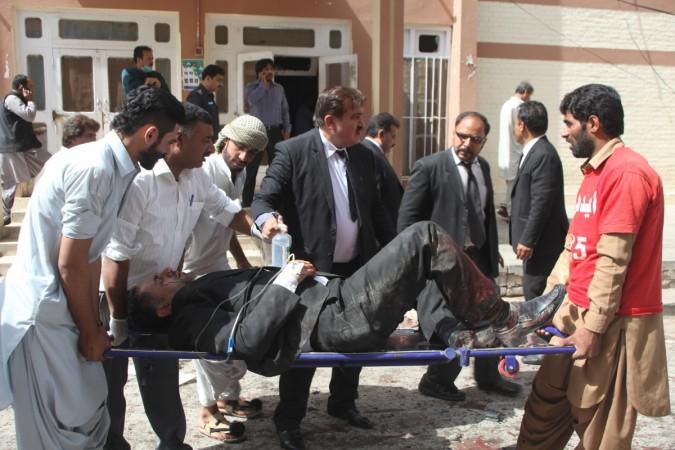
Pakistan's lies on terrorism — like when its Prime Minister Nawaz Sharif claimed in the UN that his country had managed to "turn the tide against terrorists" — have come crashing once again, with an inquiry commission on the Quetta suicide attack in August saying that there was no foreign hand involved in the act of terrorism.
The suicide attack at the main gate of Quetta Civil Hospital in Balochistan province, for which the Taliban had claimed responsibility, had led to the death of 70 people and injured another 100 people. The blast had taken place just hours after former Balochistan Bar Association president Bilal Anwar Kasi was shot dead in Quetta.
Now, the one-man commission set up by the Supreme Court of Pakistan has filed a detailed report in the attack, in which it has said: "The suicide bomber was a Pakistani and so too were a number of his accomplices." This counters Sharif's aforementioned claim in the United States, when he had said: "Our comprehensive strategy of law enforcement and targeted military operations has produced remarkable results and enabled Pakistan to turn the tide against terrorists."
Action on proscribed outfits
According to Pakistani newspaper Dawn, the report has also recommended that action be taken against proscribed outfits in the country, as well as those who are "broadcasting statements of banned organisations and terrorists."
Following the release of the report on Friday, the Pakistani Supreme Court has also recommended that the country's National Action Plan (NAP) be implemented immediately. Formulated in January 2015 following the Peshawar school attack that killed more than 100 children, the NAP has a number of provisions, like execution of convicted terrorists without delay, that have been already implemented.
However, the proposed crackdown of hate speech, and action against news outlets that transmit them, is yet to be implemented.


!['Kaise ho bhai..': PM Modi shook hands with Akshay Kumar at a media summit in Delhi [Watch] 'Kaise ho bhai..': PM Modi shook hands with Akshay Kumar at a media summit in Delhi [Watch]](https://data1.ibtimes.co.in/en/full/806317/kaise-ho-bhai-pm-modi-shook-hands-akshay-kumar-media-summit-delhi-watch.jpg?w=220&h=135&l=50&t=40)


!['Kaise ho bhai..': PM Modi shook hands with Akshay Kumar at a media summit in Delhi [Watch]](https://data1.ibtimes.co.in/en/full/806317/kaise-ho-bhai-pm-modi-shook-hands-akshay-kumar-media-summit-delhi-watch.jpg?w=220&h=138)
!['Kaise ho bhai..': PM Modi shook hands with Akshay Kumar at a media summit in Delhi [Watch]](https://data1.ibtimes.co.in/en/full/806317/kaise-ho-bhai-pm-modi-shook-hands-akshay-kumar-media-summit-delhi-watch.jpg?w=220&h=135)


